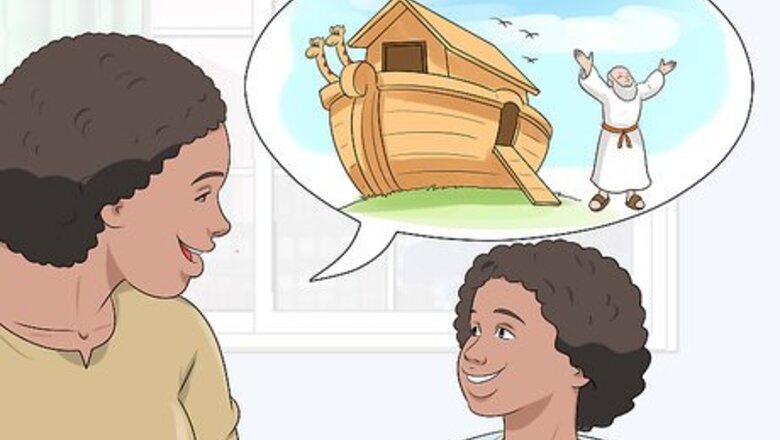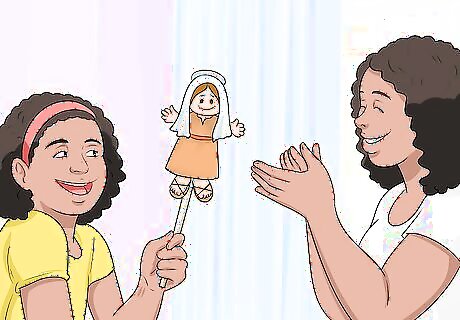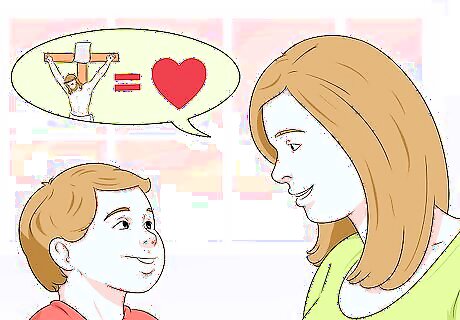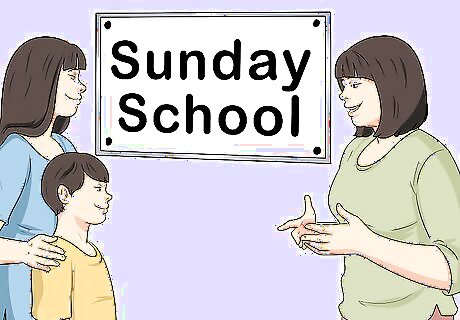
views
Telling Them a Biblical Story

Choose an easy or simpler story from the Bible to tell them. Adam and Eve, Noah and the Ark, Zacchaeus and the sycamore tree, Jonah and the great fish, or Jesus calming the storm are great places to start. If the children are older, you can go through major highlights the Bible, starting with Creation and ending with Jesus' ascension and the Great Commission to the disciples. You can also add on lessons on the fruits of the Spirit, Teach the Bible to Children Step 1.jpg

Tell the child[ren] you want to tell them an exciting, fun story, and have them sit down either at the table or on the floor. Getting children excited is a good way to have them pay more attention. Sound enthusiastic when you ask, too, so that they will be ready to learn.

Make it as interactive as possible to help them enjoy what they're being taught. Try finding a craft, coloring pages, or a game/activity that goes along with the lesson so that they will be more keen to listening.

Make sure to simplify it based on their age. Most three-year-olds won't be able to sit still for thirty minutes and listen to you talk about the Beatitudes. Likewise, ten-year-olds won't like it if you teach them in a manner used for younger children.

When reading the passage from the Bible, be energetic. Do not be monotone; use vocal inflection and changes in pitch on important words, interesting portions, or even transitions between important events or situations. Ask questions, make jokes, and be silly when appropriate. If you're reading about Noah's ark, you can make comments like, "How can all those animals fit into a boat?" or "Did the penguins sleep with the lions?" Don't get too caught up with being silly or asking too many questions; this can detract from essential teaching time, especially if you're a Sunday school teacher. Encourage the children to bring/use their Bibles and have them open to the passage you're reading from, even if they can't read yet. If you have a larger group of children old enough to read, ask for volunteers to read each verse as you go along. Teach the Bible to Children Step 5.jpg

Be open to questions and ready to answer them. For instance, if they ask questions about why the Flood came, don't tell them in a sad voice of how terrible the world is, or how they are a sinner. Tell them those bad people got punished for sinning. This can then turn into a life lesson. Before teaching, always pray that God will give you the right words to say in response; the Holy Spirit will help if you ask for it. Teach the Bible to Children Step 6.jpg
Adding Additional Activities

Teach a Bible verse. This will help them remember the Bible and its meaning in their life better. You can introduce the verse at the beginning of the lesson, practice it at some point during the lesson, and close out the lesson by practicing it once again. Know the verse well; memorize it yourself before teaching the kids. You can use a large posterboard with the words and reference on it (and use large enough lettering!). Explain the verse in terms that they can understand. For instance, if you're memorizing Genesis 1:1, you can say, "Here in this verse, we see the words 'In the beginning God created the heaven and the earth.' What do you think God created the heaven and earth from?" Teach it to them through motions (i.e. if memorizing Genesis 1:1, motion upward for heaven and downward for earth), songs (you can utilize the tunes of other songs such as "Skip to the Lou, My Darling" or "Pop! Goes the Weasel" or compose the music yourself), or varying vocal inflections (i.e. whispering or shouting). Every time you start a new lesson, practice the previously learned verse to keep it fresh in their mind. Remember this is the Word of God. This is the best gift you can give the children! If you really want to go the extra mile and if the kids are a bit older, challenge them with a "Verse Chart." For every verse they memorize, they get to put a sticker in that spot. Ten stickers will earn them a prize; then the cycle will start back again.

Make a craft based on the Bible story to tie it all in and make it visual. There are plenty of websites that offer free and even low-cost crafts for you to access; all it takes is a quick search! Make the craft yourself first. Complete an example before class to show them the end result. Have all items needed organized and ready for use. Show them which materials will be used and where they will be available. Model to children step by step. Slowly, show them how each part of the craft is to come together. Ask questions along the way to make sure they understand. Communicate time frame and then let them go. Communicate the purpose of the craft. Throughout the assembly using child like terms, remind them what the craft is supposed to help them remember about the lesson. Praise them for every positive thing accomplished during this time. If you're teaching a class, roam the room and look at each child’s work. Let them know that you are truly interested in what they've created; this can mean a lot to even the youngest of children.

Approach learning the Bible as an ongoing, long-term activity. Keep reading more stories to them and teaching them new verses. Find ways to get making them excited to learn about Jesus and the Bible. Help them grow in their relationship with God and learn to love Him. Be patient even if it takes a while. If your child does not seem interested right away, don't feel bad. You may need to change the teaching style to fit their learning capacity, or you may need to evaluate your teaching as a whole and see what areas can improve. Tell them about salvation. This is the most important truth that a child can learn. While it may seem daunting, simply using Ephesians 2:8-9 and Romans 10: 9,10,13 can point them to the cross and show them that God is the only way to Heaven. Make it clear that it's only by repenting of their sins and believing on the Lord Jesus Christ that they can be saved.] Encourage them in their faith and help to to learn how to read the Bible on their own. Teach them to set special times to read it once they know how to read.

Find a church that preaches the true Gospel and bring your family with you. Your children can learn in the Sunday school before service and also during the church services; if the church has no Sunday school, offer to start one if you're able to.



















Comments
0 comment